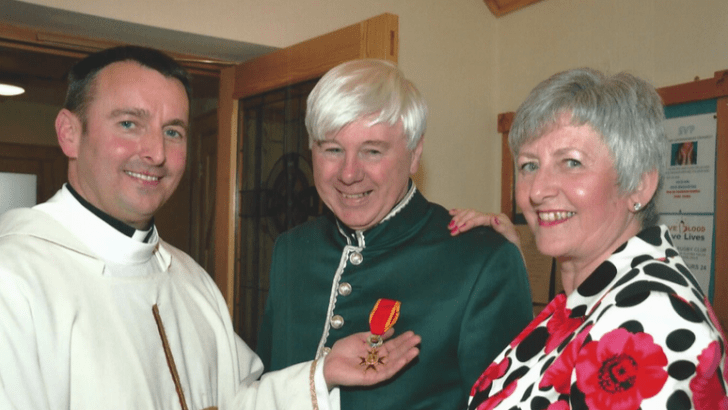There are three words that recur when you talk to Seamus McDonald, KSG, retired teacher, first-ever Irish secretary general of Unum Omnes, the International Council of Catholic Men, stalwart of the Knights of Saint Columbanus for more than 30 years and former pioneering GAA official in Co. Tyrone.
They are ‘service’, ‘community’ and ‘parish’.
They tell you a lot about his values and how they underpin his faith and his commitment to a religion that lives and thrives on praising and relating to God by doing good on the ground in the parish community.
Mr McDonald, aged 66, born and raised in Cappagh Parish, aka St Mary’s Killyclogher outside Omagh where he still lives, is quietly spoken and discreet, modest about his achievements, and stresses that he is part of a team.
He says he couldn’t have managed without the tireless support of Carmel, his wife, over the years.
Pressed on what has motivated him to give more than a generation of service to the Knights, an Irish order of Catholic laymen – motto: ‘To restore all things in Christ’ – he is clear. “I want my actions to make a difference someday, so I can make a change [to someone’s life] or help someone. Too many people see religion as Sunday Mass but religion must be part of everyday life and a growing relationship with God.”
Upbringing
Seamus McDonald recalls “a very Catholic upbringing”.
Two of his grand-uncles on either side of his father’s family were priests who served in New Zealand.
He recalls the Rosary being said every night, an aunt praying as she walked the road, and becoming an altar boy at Sunday Mass in the Chapel of the Tyrone & Fermanagh Hospital where his father, Philip was a nurse, having met his mother, Catherine (nee O’Kane) from Drumquin, Co. Tyrone who was also a nurse there until her marriage.
Mr McDonald, the eldest of three children, attended the local Recarson PS and Christian Brothers Grammar in Omagh – enjoying maths and Latin particularly – before qualifying as a teacher in St Joseph’s Training College, Trench House in Belfast in 1973 (where two Kenny brothers from Mayo also attended, including the future Taoiseach who was a year behind him).
Teaching jobs are at a premium in the North today, but he recalls being offered four jobs in one week and opting for a post close to home, teaching religion in St Patrick’s Secondary School, Omagh, now Sacred Heart, where he remained until 1979 when he became a teacher in St Mary’s Primary in his home parish in Killyclogher, a post he held right up to retirement in 2010.
“I transferred to the primary school because there, rather than taking pupils for two periods of 45 minutes a week, one had the opportunity to really get to know them and form a relationship. I particularly enjoyed preparing those young children for the sacraments,” he says.
That commitment to youth also manifested itself in his service to Tyrone GAA, first with his local Killyclogher club where he remains a member, becoming vice-chairman of the county youth committee in 1981 and chair of the county youth coaching committee in 1986.
Today he is chair of the county “strategic implementation committee, a fancy set of words” he avers but they signal Tyrone’s intent to excel and keep excelling.
Back in the mid-Eighties, he introduced, with a colleague, “the idea of coaching to the county”, taking a leaf out of what other counties such as Down were doing.
He was county treasurer of Tyrone from 2000-2006 “a glorious time when we won two of our three All-Irelands”.
But rivalling the sweetness of those epic successes were Killyclogher’s first senior county title in 2003 (when Tyrone first captured the Sam Maguire) and regaining it in 2016.
“It was a delight to see the sons of players we had coached years before, like the McCann brothers and Mark Bradley, come through [in 2016], that the wee bit of support we gave them contributed to being part of something,” he says.
But it has been in the Order of Knights of St Columbanus, where he has served in numerous senior capacities at local, provincial and national level, including the highest office, Supreme Knight from 2008-11, where he has made his greatest impact.
Reflecting on his time as Supreme Knight it is clear that the clerical sexual abuse scandals which raged at that time with the publication of the Murphy Report and subsequent summoning of the Irish bishops to the Vatican and the Pastoral Letter to Ireland by Pope Benedict XVI cast a shadow.
“It was a very difficult time because so many people were hurt and there was so much anger and a feeling of despondency.”
He recalls that the Order was asked by the bishops to give its views on the Pastoral Letter and such was the atmosphere at the time that one council (branch) declined to co-operate and another decided to send their comments direct to the Pope because they feared it would be doctored.
Mr McDonald was invited to join the Knights in Omagh in 1977 and admits having been “a passive member” until 1985 when he was appointed vice-chairman of the Omagh council.
There were 67 members when he joined but this had fallen calamitously to just six in 1985, due largely to the deteriorating security situation “army checkpoints and all that” and he faced a huge task in rebuilding it to the point today where there is a vibrant 46-strong membership.
“There was a lot of teamwork, a lot of prayer and soul-searching. There is no point in inviting people along without developing them and giving them concrete work to do, otherwise they drift away. You roll up your sleeves, and try to enlist people who are active in the Church and build up community, just as Pope Francis [pictured] asks of us,” he says.
In keeping with the charitable remit of the Knights, ongoing initiatives in Omagh focus on alleviating problems such as debt, suicide and poverty through, for example, organising 200 Christmas food hampers for four local Conferences of St Vincent de Paul at a cost of £3,400.
Since 2015 Seamus has spearheaded the Knights’ Schools Public Speaking Competition which they established to mark their centenary, adding to the John Paul II Awards, which the Knights also sponsored.
The competition has been such a success, attracting 50 schools from all over Ireland, that it has become an annual fixture and next year will be expanded with greater participation in Connaught. One school, St Ciaran’s, Ballygawley, Co. Tyrone has fielded up to seven teams.
“It gives me great joy to see so many young people witness so eloquently to their faith and show such a grasp of Church teaching,” Seamus says.
In 2012, he was appointed secretary general of the Catholic NGO, Unum Omnes, “an international lay organisation trying to promote Catholic values” active in 35 countries, with the Knights providing its representation in Ireland.
“It was a great honour to be the first Irishman to hold this post,” he says.
It is a part-time voluntary post that entails several visits to Rome and other locations each year and its focus includes development and the environment.
His travels abroad have left him concerned at an international trend of male lay non-participation in volunteering and in the mission of the Church, but he is emboldened by Christ’s promise of continued grace to prevail.
At the end of April Seamus and Carmel experienced “an unforgettable moment” when they were present in Rome to hear Pope Francis address the Congress of Catholic Action of which Unum Omnes is part.
“He is the best communicator I have ever witnessed, using stories to great effect, he inspired me.”
Seamus commends readers to see and hear it for themselves on YouTube and on www.unum-omnes.org where there is an English translation.
In 2011, Seamus was appointed a Knight of St Gregory by Pope Benedict XVI in recognition of his service to the Church.
“I felt it was not a reward for me but an award to the community that I belong to. Yes, it is an honour and I am proud of it but not one I really deserve when you consider what others have done.”


 Martin O'Brien
Martin O'Brien Seamus McDonald with his wife Carmel and their parish priest, Fr Kevin McElhennon, of St Mary’s, Killyclogher – the church where he was baptised.
Seamus McDonald with his wife Carmel and their parish priest, Fr Kevin McElhennon, of St Mary’s, Killyclogher – the church where he was baptised. 